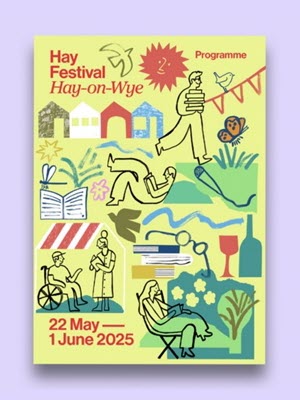Hay Literary Festival, 2025
 The chances of getting good SF&F writers at Hay are very slim, but you do get good history and feminism writers, and anyway it is just over the mountains from me, so I figured I should go and support the general idea of books.
The chances of getting good SF&F writers at Hay are very slim, but you do get good history and feminism writers, and anyway it is just over the mountains from me, so I figured I should go and support the general idea of books.
Much to my surprise and delight, I managed to pick a day on which there were four writers I was interested in seeing, and one of whom was a friend. So off I went.
The first session I attended was with Edith Hall. She’s a well-known Classicist, but the book she was promoting is a bit of a departure. It is an book about The Iliad seen from an environmentalist perspective. That may seem a little odd, but actually there is a substantial amount of environmental destruction that takes place in the book. Have you any idea how many trees you have to fell to build a thousand ships? And then the Greeks are camped outside of Troy for 10 years, meaning that a lot more wood is required for building camps, repairing ships, cooking meals, raising funeral pyres, and of course building a wooden horse.
There’s also the question of weapons. The Trojan War took place in the Mediterranean’s Bronze Age. Smelting metal requires a very hot fire which means, you guessed it, more wood. Hall is of the opinion that we should date the start of the Anthropocene from the birth of metallurgy. I can see her point.
What you may not know is that the area around Mount Ida, the mountainous country to the south of the plain on which Troy stands, is an area of outstanding natural beauty. In times past it was sacred to the goddess Cybele. However, Hall revealed that a mining company has been busily felling many of the trees in the area. The Turkish government is now supposedly taking action, but the damage has been extreme and it is unclear whether the govenrment has sufficient will to do anything effective. I was so appalled that I went straight to the Woodland Trust tent at the festival and signed up. Not that that will have any direct effect in Turkey, but I’m assuming that Cybele will notice. I’m sure she can think of a suitable punlishment for the miners.
Anyway, the book is called Epic of the Earth, and I am looking forward to reading it.
Next up was Amy Jeffs and her new book, Saints. This is a collection of stories about saints, some of whom have remarkably interesting lives. Jeffs seems to have constrained herself to writing about people whose sainthood has actually been approved by the Catholic Church, which is a shame because many of the Welsh saints have even more bizarre lives. I might have to write a companion book.
Jeffs is a remarkably talented young woman. She does all the art for the books as well as write them. The content is a combination of fiction and history. And in the session she showed that she has a fabulous singing voice as well. Fortunately I am too old to be jealous.
Session three was with one of my feminist heroes: Cordelia Fine. She’s a psychologist and feminist philosopher from Australia who has written some wonderfully insightful and entertaining feminist books. I did a review of her previous book, Testosterone Rex, on my blog back in 2017 and have included it in this issue.
The new book, Patriarchy Inc., is all about the Diversity & Inclusion industry, and why Fine thinks it fails at what it sets out to do. As a former diversity trainer, this is of considerable interest to me. Fiona Moore, if you are reading this, you should get the book too.
I got to ask a question at the end of the session. Fine said that it was “very insightful”. I can die happy now.
Mid afternoon my friend Jo Lambert arrived and we did a bit of shopping. Then there was the food hall. Pizza!
The final session that I had booked was with Sion Faye, whom I knew from Bristol (where she grew up). Her new book, Love in Exile, is not specifically about trans issues, but it is of course deeply informed by the difficulties and dangers of dating while trans. It is also informed by her time as an agony aunt for Vogue. Sion is very smart, and I’m looking forward to seeing what she has to say.
I stayed over in a nearby hotel because I couldn’t face a 2 hour drive home late at night. I highly recommend the Castle Hotel in Brecon, should you ever be around these parts. And I spent Saturday morning checking out the Roman remains in the area. Brecon was home to a unit of cavalry from Hispania. That makes it hugely important to the post-Roman history of Wales.